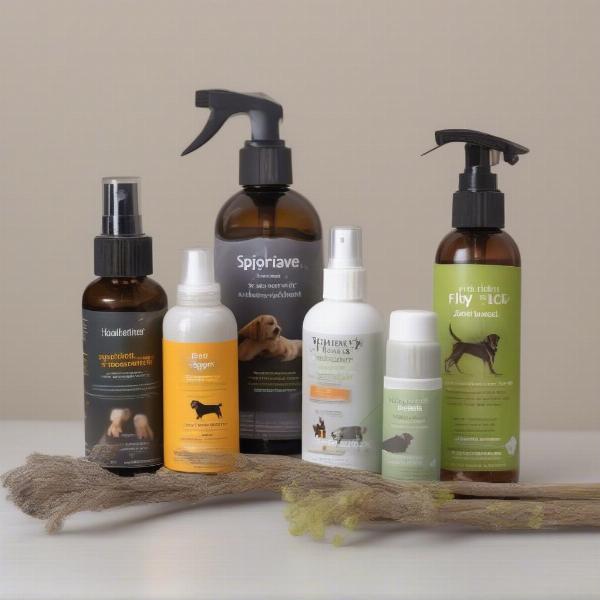Fly spray for dogs is a crucial part of responsible pet ownership, especially during warmer months. Flies, mosquitoes, ticks, and other pests can not only be a nuisance for your dog but can also transmit diseases. Choosing the right fly spray and understanding how to use it correctly is essential for your dog’s comfort and health. This article will guide you through everything you need to know about fly spray for dogs, from choosing the right product to application techniques and safety precautions.
Choosing the Right Fly Spray for Your Dog
With a wide variety of fly sprays available, selecting the right one can seem daunting. Consider your dog’s age, size, breed, and any sensitivities they might have. Look for products specifically formulated for dogs, avoiding those designed for other animals.
Types of Fly Sprays for Dogs
- Natural Fly Sprays: These typically contain essential oils like citronella, lemongrass, or lavender. They offer a gentler approach, ideal for dogs with sensitive skin. However, their effectiveness can be shorter-lived.
- Chemical Fly Sprays: These often contain pyrethrins or permethrins, synthetic insecticides that offer more potent and longer-lasting protection. Always follow the manufacturer’s instructions carefully when using chemical sprays.
- Combination Sprays: Some products combine natural and chemical ingredients to offer broader protection against various pests.
 Choosing the right fly spray for your dog
Choosing the right fly spray for your dog
Applying Fly Spray Safely and Effectively
Proper application is key to maximizing the benefits of fly spray and minimizing any potential risks. Always follow the product’s instructions, and consider these tips:
- Outdoor Application: Apply the spray outdoors in a well-ventilated area to avoid inhalation.
- Even Coverage: Spray lightly and evenly over your dog’s coat, avoiding the eyes, nose, and mouth.
- Rub-in Method: For longer-haired dogs, gently rub the spray into the coat to ensure it reaches the skin.
- Reapplication: Follow the manufacturer’s guidelines for reapplication frequency. Over-application can be harmful.
Addressing Common Concerns about Fly Spray for Dogs
Is fly spray safe for puppies? Many fly sprays are not suitable for puppies younger than a certain age. Consult your veterinarian for recommendations on puppy-safe options.
What if my dog licks the fly spray? While most fly sprays are designed to be relatively safe if ingested in small amounts, excessive licking can cause stomach upset. Prevent your dog from licking the sprayed area until it dries. fly spray for dog
Can fly spray cause allergic reactions? Some dogs can be sensitive to certain ingredients in fly sprays. Always test a small area of your dog’s skin before applying the product all over. dog fly spray
Natural Alternatives to Fly Spray
If you prefer to avoid chemical sprays, several natural alternatives can help repel flies and other pests. These include:
- Apple Cider Vinegar: Diluted apple cider vinegar can be sprayed on your dog’s coat or added to their drinking water.
- Essential Oils: Certain essential oils like citronella, lemongrass, and eucalyptus can be used in diffusers or diluted and applied topically. natural repellent for ticks on dogs Always consult with a veterinarian before using essential oils on your dog.
- Fly Traps and Repellent Plants: Strategically placed fly traps around your yard and planting fly-repellent plants can help reduce the overall fly population.
Conclusion
Choosing the right fly spray for dogs and applying it correctly is essential for protecting your furry friend from pesky insects and potential diseases. By understanding the different types of fly sprays available, following safety precautions, and considering natural alternatives, you can ensure your dog stays comfortable and pest-free all year round. Remember to always consult with your veterinarian if you have any concerns about your dog’s health or the use of fly spray. insect repellent for dogs
FAQ
- What is the best fly spray for dogs? The best fly spray depends on your dog’s individual needs and sensitivities. Consult your veterinarian for personalized recommendations.
- How often should I apply fly spray to my dog? Follow the manufacturer’s instructions for reapplication frequency.
- Can I use human fly spray on my dog? No, human fly spray often contains ingredients that are toxic to dogs.
- What should I do if my dog ingests fly spray? Contact your veterinarian immediately.
- Are there any natural alternatives to fly spray for dogs? Yes, options include diluted apple cider vinegar, certain essential oils, and fly traps.
- Can fly spray prevent heartworm in dogs? While some fly sprays repel mosquitoes, they do not prevent heartworm. Consult your vet about heartworm prevention medication.
- Is fly spray safe for pregnant or lactating dogs? Consult your veterinarian before using any fly spray on pregnant or lactating dogs.
ILM Dog is your trusted resource for all things canine. We provide expert advice on dog breeds, health, training, nutrition, grooming, and much more. Our mission is to empower dog owners worldwide with the knowledge and resources they need to provide the best possible care for their beloved companions. Whether you’re a seasoned dog owner or just starting your journey, ILM Dog is here to support you every step of the way. Contact us at [email protected] or +44 20-3965-8624 for personalized advice. Connect with ILM Dog today!